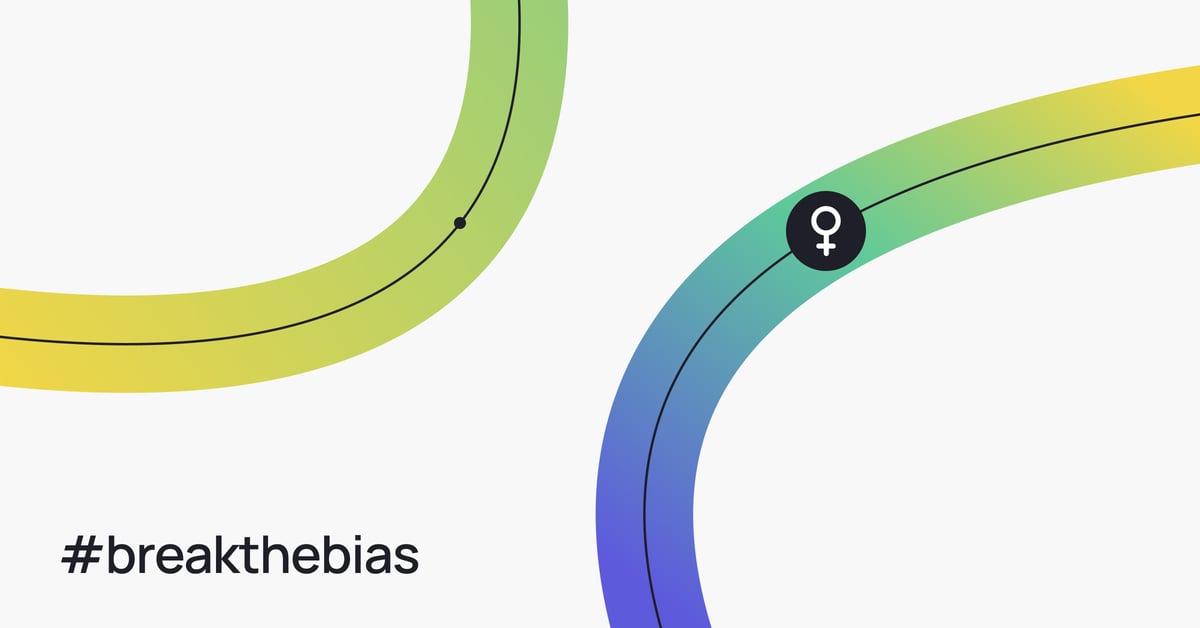At Ultimate, diversity has never felt like an “add-on”. We’ve never scrambled to insert more equal structures into something that was skewed from the start — it’s just been a natural part of our evolution from day one. That has a lot to do with our Finnish roots and the fact that one of our co-founders is a woman. Today, 40% of our company identifies as female. While that leaves room for improvement, we feel that’s not bad for a global deep tech business with 120 employees and counting.
And while public figures like Sheryl Sandberg and the #girlboss narrative have helped spark a global discussion about women wanting more at the workplace, in leadership roles, and in tech, there are so many more perspectives that need to be heard.
To celebrate International Women’s Day and Women’s History Month, we took a step back to reflect on this year’s theme, #BreakTheBias. The best way to break a bias? Listening and sharing experiences. So we asked five female UltiMATES, from a range of departments and years spent with us, to share theirs.
They are:
- Franziska Hempel, Engineering Manager
- Lacy Silas, Graphic Designer
- Sarah Al-Hussaini, Co-Founder & COO
- Mai Belbesy, Associate Product Manager
- Inés Lladó, Sales Development Manager
We asked them each the same two questions. Here’s what they had to say:
Have you encountered bias in your career? Were you able to break it?
Sarah: I cofounded Ultimate at 24 years old. For years, I wouldn’t tell anyone how old I was. I also wouldn’t tell anyone what I did. It just felt like such a big and unnatural statement.
I didn’t feel like I could confidently talk about it, let alone boast.
There aren’t many 24-year-old female cofounders or COOs in tech. So being one of the first women to step into that space brought a lot of attention with it. But I also faced internalized bias.
“I found it particularly hard to reconcile two identities inside me: The young woman and the woman in tech.”
- Sarah Al-Hussaini, Co-Founder & COO
Mai: I remember applying for a technical job and being told that it wasn’t a good fit because I was married and the job would have required me to travel and work intense hours.
“For many years, I had the feeling I wasn’t expressing myself properly. It took others to point out to me that I’m not terrible at communicating. Sometimes people just more easily take a point as valid when it comes from a man.”
- Inés Lladó, Sales Development Manager
Lacy: I’ve experienced bias in the form of tokenism, where people have told me that being black was the deciding factor for being hired at a job. I’ve also experienced being silenced in a work context — I remember being at an interview where someone from the hiring committee came in late and asked me to talk about my background — and someone else decided to jump in and lay out my background to them in my place.
Franzi: I’d say one form of bias I’ve encountered has been “well-intentioned” or “protective” bias within working teams.
“I think many people still assume that women are just “naturally” better at communicating and on the organizing side of things.”
- Franziska Hempel, Engineering Manager
I’ve seen it happen during projects where we knew we’d be facing stress, tight deadlines, all-nighters, and where we knew it would be crucial for team members to assert themselves under pressure — sometimes, in these projects, it was just assumed that the women on the team needed and wanted to be “spared” or “protected” from all of that.
Read up on women’s leadership in CS
How can we collectively contribute to #breakingthebias, as well as educating ourselves and others around it?
Ines: Being able to inform women is so powerful. At one of my workplaces, we had women lunches once a month. That was the perfect place for those of us who had experienced bias to share their experience with others. The more we speak about it, the easier it is for things to be resolved.
Lacy: At work, but also anywhere else, it’s important to put in that critical thinking yourself instead of pushing the mental load onto someone else. For example, people often ask me how my hair works, but you could also… ask Google or YouTube.
“I personally don’t mind doing some of that education, but the next step is on you.”
- Lacy Silas, Graphic Designer
Franzi: We don’t just magically gravitate to the “softer”, more communicative tasks. The solution, in my opinion, is to make these decisions collectively within your team — don’t just decide over peoples’ heads because then there’s no way you can check your bias.
“My strategy is: Prove them wrong by just doing it. My goal isn’t proving to you that I can do it, because I will do it. You can think whatever you want!”
- Mai Belbesy, Associate Product Manager
Sarah: I had to learn how to boast about my professional achievements, and how to feel comfortable doing it. So I think women need to boast more. It might feel unnatural, but it’s a muscle you can train. Also, don’t feel alone for being the first woman occupying a space usually reserved for men. You don’t know who else in the room is also super driven — make her feel more normal. Recognize that women may be less likely to boast, and to negotiate — promote them. Give credit publicly, help women practice boasting and asking for what they want. Normalize driven women!
To get the deep dive into each of our five UltiMATES’ stories throughout the month of March, follow us on LinkedIn.
